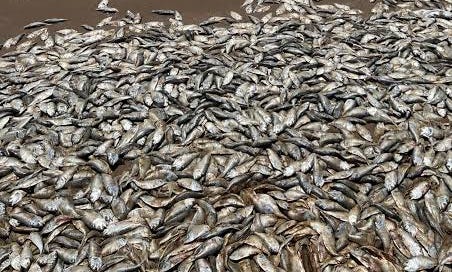Croaker, Catfish, Crustaceans cast ashore: blame Climate Change
Putting the blame on climate change for the rising occurrence of fish washed ashore by oceans
Fish washed ashore, Courtesy, New York Times
The ocean washed nearly twelve thousand fish to a stretch of space about two miles long on the Quintana Beach County Park, Texas recently, creating a devastating impact on the local fishing industry, with many businesses that rely on mullet, croaker, and catfish for survival having to close.
Eight thousand miles away on a beach in Hong Kong a few weeks ago, the ocean washed hundreds of fish ashore at the St Stephen’s Beach, with the creatures giving off a fetid odor so strong people working on the street nearby could perceive it.
In January 2021, the authorities in Uganda witnessed a strange sight, as Lake Victoria, Africa’s largest freshwater lake, washed ashore a large amount of fish to Lake Kyoga and River Nile, with the Nile perch the victim, forcing the authorities to warn people against eating them.
The fishing population and marine life perish at staggering rates nowadays, many of them washed onto stretches of beach by the ocean or lake, with the United Nations Food and Agriculture Organisation (FAO) estimating that 35 percent of all fish, crustaceans, and mollusks gets lost before they ever make it to the consumer.
The incident at Quintana Beach took place during a spike in temperatures, with the mercury hitting 33 degrees Celsius, a condition blamed on the warming Gulf Coast waters through the climate crisis, a situation aligning with the overall warming in the North Atlantic basin.
In Hong Kong, the cause of the mass death of fish could not be determined, but at the nearby Repulse Beach, just 2.5 miles away from St Stephen’s beach, the water tested positive for the bloom of algae, which thrives during higher levels of carbon dioxide presence, making experts to blame it for starving the fish of oxygen.
The Nile perch in Uganda grows to a weight of more than 100 kg, but oxygen levels impact on the creature, especially when below two milligrams per liter of water. Many experts blame the warming Lake Victoria water for the washing up of the Nile perch, because warm waters starve fish of the required oxygen needed for its survival.
In the case with Lake Victoria and the Quintana Beach, climate change, among other factors, proved to be the culprit, through the warming waters that starved the fish of the required oxygen needed for survival, while climate change also fuelled the mass die-off at the St Stephen Beach, through the presence of the bloom of algae, which thrives during an increased presence of carbon dioxide, an effect of climate change.
According to researchers, the amount of oxygen in 400 lakes in the United States and Europe showed a decline in the quantity of dissolved oxygen, which fell by 5.5 percent in surface waters of the lakes and 18.6 percent in deep waters, meaning that as climate change continues, further declines of oxygen can be expected in lakes.
Ocean warming increases the deoxygenation of the ocean, and it’s no surprise that oxygen contents of the oceans decreased by one to two percent since 1960, with the rate of oxygen levels decline in some tropical regions occurring by a startling 40 percent in the last 50 years.
Though algae play a vital role in the marine ecosystem, they also bring harm, and since they already cost 82 million dollars a year to the U.S. economy, they could create more problems going forwards, meaning their growth through carbon dioxide emissions could create deaths of fish in the United States and other places on the planet.
The meaning of the fish die-off on the Quintana Beach Park could imply a greater occurrence of the event through worsening climate change, while similar places like St Stephen Beach could continue to experience rising quantities of blooms of algae, with lakes of Africa going through the same scenario due to drastic declines in oxygen levels.
Ocean oxygen levels could fall an average of three to four percent by 2100, but through a slow-down in carbon emissions and the reduction in ocean nutrient pollution, a widespread ocean oxygen loss could be prevented, to reverse a situation where oxygen content of the ocean declined by around 2% since the middle of the 20th century overall, while the volume of ocean waters completely depleted of oxygen quadrupled since the 1960s.
The Fifth Assessment Report published by the Intergovernmental Panel on Climate Change (IPCC) in 2013 indicated that the ocean had absorbed over 93 percent of the excess heat from greenhouse gas emissions since the 1970s, but through the mitigation targets set by the Paris Agreement on climate change and holding the rise in the global average temperature to well below 2°C above pre-industrial levels, the world could help prevent the consequences of escalating temperatures on oceans’ habitats and their services.
In 2018, more than 300 reported incidents of toxic or harmful algae blooms took place around the world, and in 2020 about 130 got listed on an international database, but these numbers could witness a decrease through agricultural changes – including regulations to reduce the nutrient load – and tackling the climate crisis.
In sum, the fish population could stop perishing at the present rates through a halt to climate change, meaning drastically cutting down on greenhouse gas emissions, which in turn prevent oxygen loss in the world's oceans, lakes, and rivers.
Victory Ashaka: Warrior for Climate Action
Victory Ashaka
Please tell us about your journey to becoming a climate activist.
Ashaka: I’m a spoken word artiste, a climate activist and a Lagos state youth ambassador. I was born in Namibia to Nigerian parents and at the age of two, I returned to Nigeria with my family. I’m a recent graduate of English Literature from Lagos State University (LASU).
Growing up, I found interest in poetry and arts. The age of 12 was the defining moment in my life when I applied for a literary art competition and I won. It gave me the opportunity and courage to go into social impact and change-making. That experience transformed my trajectory and gave me new perspectives.
Also, when our parents see that we are really passionate about something and we have the confidence to see it through and they see results, they would give their support. In 2020, the global crisis (COVID-19) shocked the world and caused a number of deaths. In fact, as deadly as the pandemic was, I thought the effects of climate change could even be worse.
So, I got engaged with an organisation whereby we had to depict different artworks on climate change, to create climate solutions. That was my first exposure to climate activism. I did different artwork. I wrote a poem on climate change and we had the UN’s deputy secretary general join us in the project. That was how I started as a climate activist and a spoken-word poet.
Last year, I also had the opportunity to do that in Italy at the FAO world food forum where I did a performance on ‘healthy diet, a healthy planet and heal the world’.
My experiences and participation in various projects have reaffirmed to me that greatness comes from the most unlikely places and that anybody can rise when the opportunity is right. I’m grateful for that and I hope that I also become a beacon of hope for other people to find their path.
How have you invested in the planet through the work that you do and how can others do the same?
Ashaka: Personally, through my actions. I invest in the planet by doing things that are eco-friendly. For example, I don’t waste water. I don’t dispose waste inappropriately, and I do my best to conserve energy. I also tell other people to do this and keep the environment clean. I ensure that I enlighten other people about climate change.
I also create awareness for those who do not believe that the impact of climate change can be catastrophic and I inspire them to do better in their actions. I believe everybody needs to be educated and so in my immediate community, with my network, I ensure that people get the message of sustainability. I let people know the right things to do because our actions and inactions definitely affect the planet.
We need to conserve energy by reducing our carbon footprint and planting more trees. Also, I carried out a tree-planting exercise with my team of other ambassadors. We reach out to different schools and local governments in Lagos to plant trees. I also believe that every little action counts and even more, people’s contributions are needed for our planet’s sustainability.
What do you think is the most pressing issue related to climate change right now?
Ashaka: I think that would be the pollution of the environment. The atmosphere is just being polluted. Globally, the burning of fossil fuels and greenhouse gas emissions are major pollutants of the environment. People are not breathing fresh air any longer. There has also been an extreme change in weather conditions. People just cut down trees without proper knowledge of the need for planting trees that could give us oxygen and could sequester carbon emissions in the atmosphere.
What role do you think governments and businesses can play in investing in our planet?
Ashaka: The government is there to create and enforce policies. The role of the government should be to develop climate policies and climate resolution. Governments should enforce rules that would guide people’s actions in relation to the environment. Environmental pollution of any kind should be a criminal offence.
Governments should also invest in climate finance. They should provide funding for projects and people’s enlightenment programmes. In Nigeria, the government can build more train stations to accommodate more people so that the number of vehicles on our roads can significantly reduce. The generation and use of solar power in our homes and offices should also be encouraged.
What has been your most memorable campaign?
Ashaka: The one that was held in 2020 with the Solution 17 global community that had the UN deputy secretary general in attendance. Four other colleagues and I created 17 artworks on the SDGs relating to climate change. We developed a concept note for the paintings and we spoke about them.
Another remarkable one was last year in November while COP27 was ongoing. My team and I decided to embark on a project tagged “Plant a Tree for Life” in schools and some LGAs in Lagos. I think that was a huge one because of the reception. We were able to enlighten young people, children, teachers and people in the local areas.
Culled from The Cable
What to Eat
Uganda vegan diet, Credit:Veganthropologist






